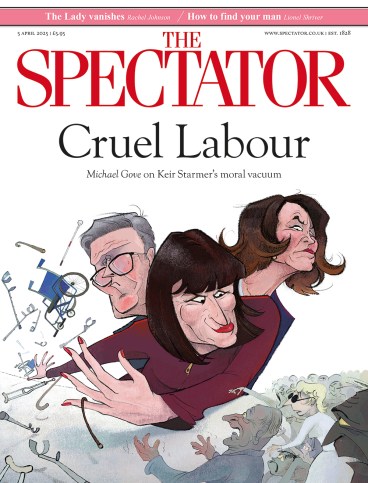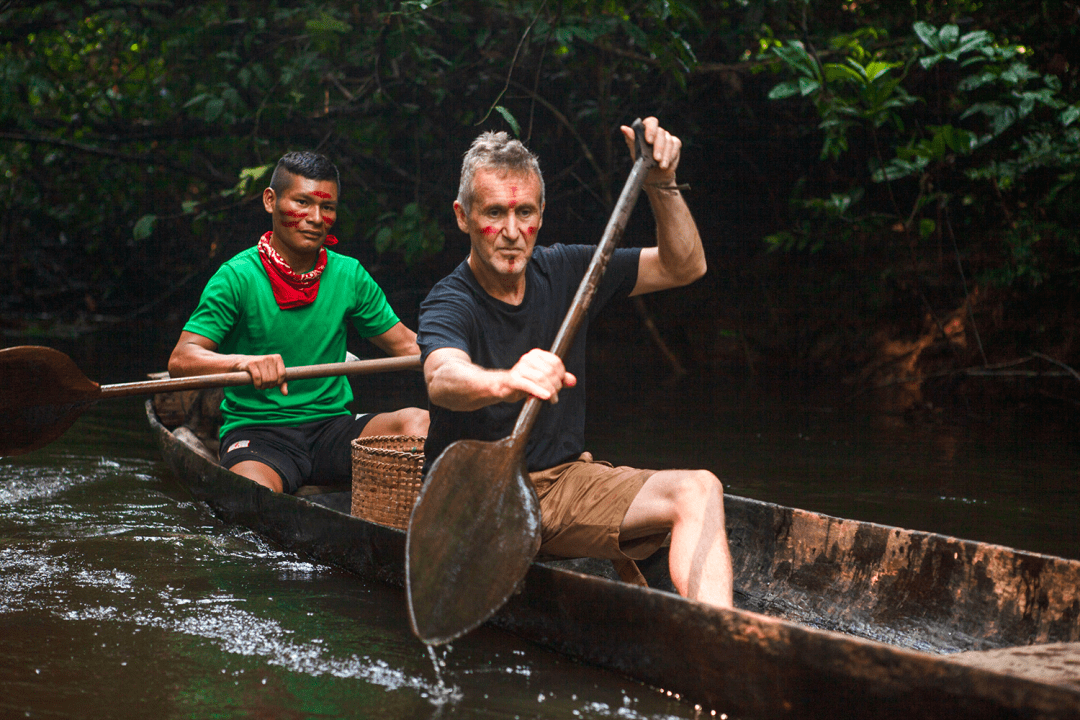
Tribe with Bruce Parry ran for three fondly remembered series in the mid-2000s. Now, upgraded to Tribe with Bruce Parry, it’s back, still championing traditional ways of life – including that of a TV presenter who lives among remote peoples, takes loads of drugs with them and marvels at their closeness to nature.
Sunday’s episode featured some other age-old practices, too. Parry, for example, duly travelled up an Amazon tributary to a village where the locals were initially suspicious of ‘the white man’. He then won them over by mucking in with the chores and eating plenty of insects and grubs.
His companions this time were the Waimaha, who live in the Colombian rainforest, communing with its spirits. Before he got there, Parry excitedly told us how the ‘long knowledge’ of indigenous people has much to teach us about ‘our connection to the planet’. But he also warned that since he was last tribal on television, millions of them ‘have had to leave the place they called home’. So would he find the Waimaha ‘thriving’ or ‘under threat’ – or, as I’d suggest he really hoped, a bit of both?
Twenty years on, Parry’s enthusiasm for going native remains impressively undiminished. As ever, the early small talk tended to the awkward. (Understandably, he wasn’t sure how to reply to an opening gambit of ‘Yesterday, a jaguar ate my mother’s dog’.) But his unmistakable sincerity soon gained the trust of the elders, under whose tutelage he’d be taking part in the show’s big finish when – as you might imagine – he’d join them for some powerful hallucinogens at a ritual ceremony.
As the big day approached, Parry’s enthusiasm became increasingly infectious. At the ritual itself, it was also hard to resist his blissed-out pieces to camera about how ‘beautiful’ everything was. The mutually affectionate farewells when he departed felt touchingly well earned.
And yet, in the cold light of day, my inner spoilsport couldn’t help noticing how Parry had found exactly what he’d wanted to – or even decided in advance that he would. Sure enough, he saw evidence that Waimaha culture was under threat from the Colombian government insisting the children go to school. But – somewhat brushing over the implications of his passing mention that they trade with outsiders and speak Spanish – he decided that Waimaha were still an unspoiled lot, living an idyllic life in ‘paradise’. In short, that they were thriving.
Those elders, too, appeared almost spookily aware of Parry’s preordained script. ‘We respect the Earth,’ he was told. ‘If the forest is happy, the people are happy. We live here like our ancestors have done before us.’
At one point, a woman talked about her sister who’d left the village aged 15 to become a nanny and never returned, because she now thought ‘like a white person’. Naturally this was put forward as sad and reprehensible. But might it be that the girl was imaginative enough to want more than to forage in the rainforest until she died, and had been glad to escape what must be a fairly claustrophobic existence? Parry obviously (and entertainingly) enjoyed his three weeks among the Waimaha. But a lifetime?
Those elders, too, appeared almost spookily aware of Parry’s preordained script
BBC1’s Austin is one of those sitcoms that doesn’t seem sure how heavy to go on the com. Julian (Ben Miller), a bestselling children’s author, was on a tour of Australia when he retweeted a ‘perfectly reasonable’ post by someone who turned out to be a neo-Nazi. His next signing event in Canberra was immediately cancelled – along with him – and later that day he was approached by a man in his late twenties called Austin who told him: ‘I’m pretty sure I’m your son.’
The bad news is that Austin was conceived after Julian had started going out with his future wife and illustrator Ingrid (Sally Phillips), who’s now on the brink of quitting the two roles as a consequence. The good news is that Austin (Michael Theo) is autistic – and Julian’s PR people think a newfound autistic son could be just the ticket to halt his cancellation.
All of which could certainly have been played for comedy – but only if the show were darker and more cynical than it would clearly like to be. Instead, it’s going for something warm-hearted – and more or less achieving it, thanks largely to Theo’s ability to make us as fond of Austin as the writers plainly are.
So what to do for laughs? The solution is to rather crowbar them in using such well-worn sitcom templates as contrived misunderstandings, characters giving preposterous explanations and a middle-aged bloke taking his unawareness of the modern world to implausible lengths.
The result so far is watchable enough, but the uncertainty about how many jokes to include – and about how dramatic to make the dramatic parts – lends the whole thing an oddly hesitant tone.








Comments